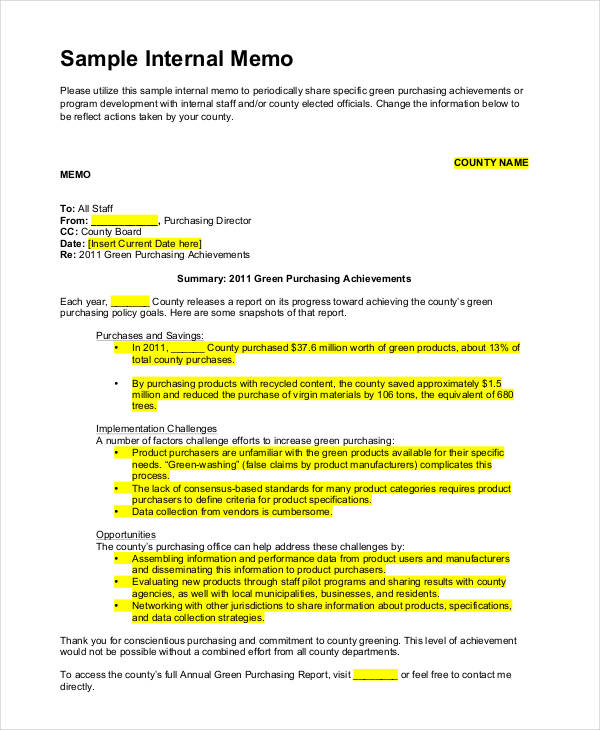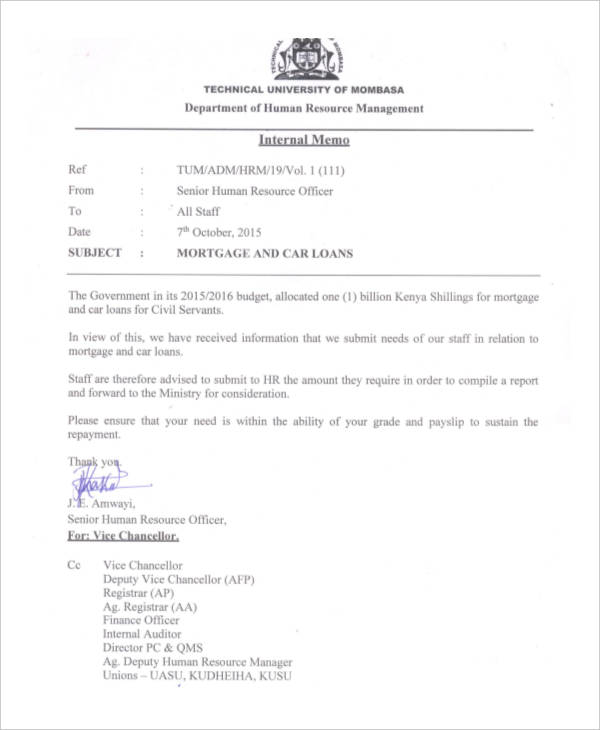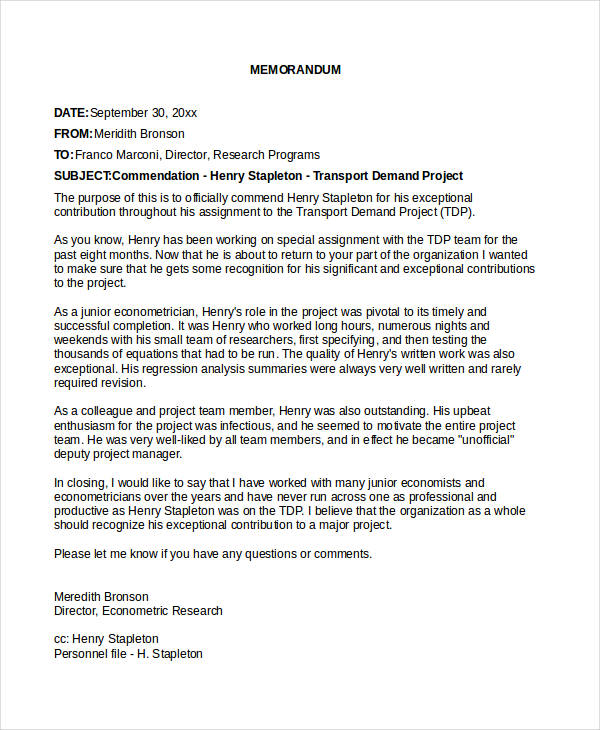15+ Internal Memo Examples to Download
Getting a message or information through to the entire members of an organization is sometimes considered to be a form of art. You need to be adaptive enough to know which words to use to get the attention of the reader and yet stay true to the precise topic. Fail one of these and an employee may not find time to read or even just browse through your memo.
Business memos today are written to be short and yet concise for it to be considered as an effective memo. Internal memo examples shown in the page provide added information regarding memos.
What Is an Internal Memo?
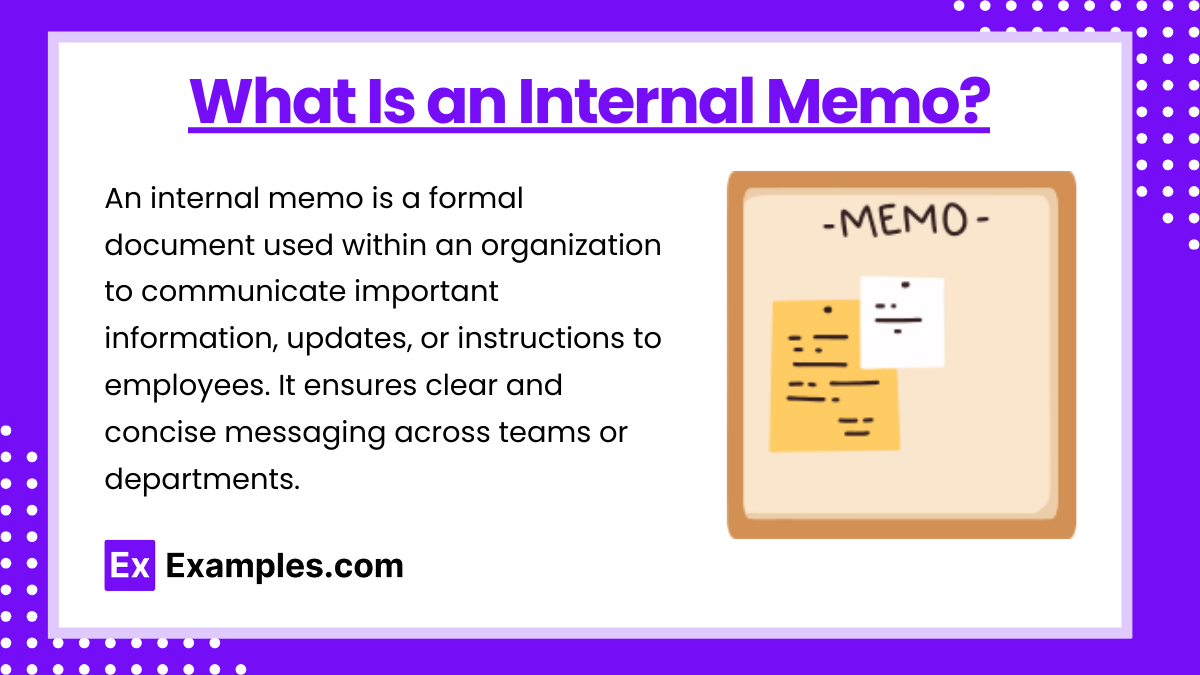
An internal memo is used in the corporate or business environment to communicate and provide information to colleagues and managers about projects, specific goals, policy changes, and other work related subjects.
Company Memo examples and blank memo examples seen on the page are to provide you with basis in the structure and making your own memo. Go ahead and download the samples by clicking on the download link button below it.
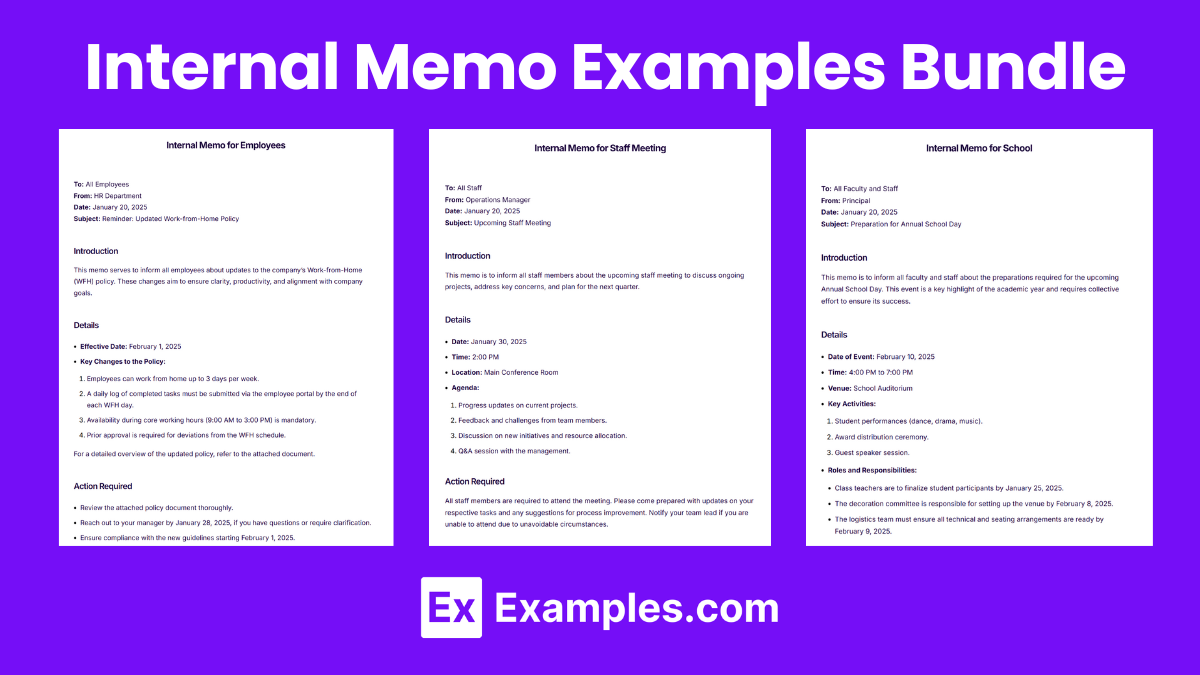
Download Internal Memo Examples Bundle
Internal Memo Format
To: [Recipient(s)]
From: [Sender’s Name and Title]
Date: [MM/DD/YYYY]
Subject: [Brief and Clear Subject Line]
Introduction
State the purpose of the memo clearly. Provide any necessary background or context to help the reader understand the subject.
Details
Action Required
Specify the actions that the recipient(s) need to take. Include deadlines, responsibilities, or any follow-up steps that are necessary.
Conclusion
Summarize the key points of the memo and emphasize the importance of the information provided. Include an invitation to reach out for further clarification if needed.
Attachments
List any supporting documents or files that are included with the memo, if applicable.
Internal Memo Example
To: Sales Team
From: Sarah Johnson, Sales Manager
Date: January 20, 2025
Subject: Monthly Sales MeetingIntroduction
This memo is to notify you about the upcoming monthly sales meeting. The purpose of this meeting is to review performance metrics, discuss challenges, and strategize for the next month to meet our sales targets.
Details
- Date: January 25, 2025
- Time: 10:00 AM
- Location: Conference Room 2
- Agenda:
- Review of December 2024 sales performance.
- Identification of bottlenecks in the sales process.
- Brainstorming for lead generation strategies.
- Q&A session with the management team.
Please bring the following documents:
- Last month’s sales report.
- Current client engagement data.
Action Required
All team members are required to prepare a brief update on their sales progress and highlight key challenges faced during the previous month. Submit your updates to me by January 24, 2025, for review.
Conclusion
Your participation and input are crucial for improving our strategies and achieving our monthly goals. Feel free to contact me if you have any questions or need assistance in preparing your updates.
Attachments
- December 2024 Sales Performance Report
- Updated Sales Strategy Guidelines
Internal Memo Examples
Internal Memo for Employees
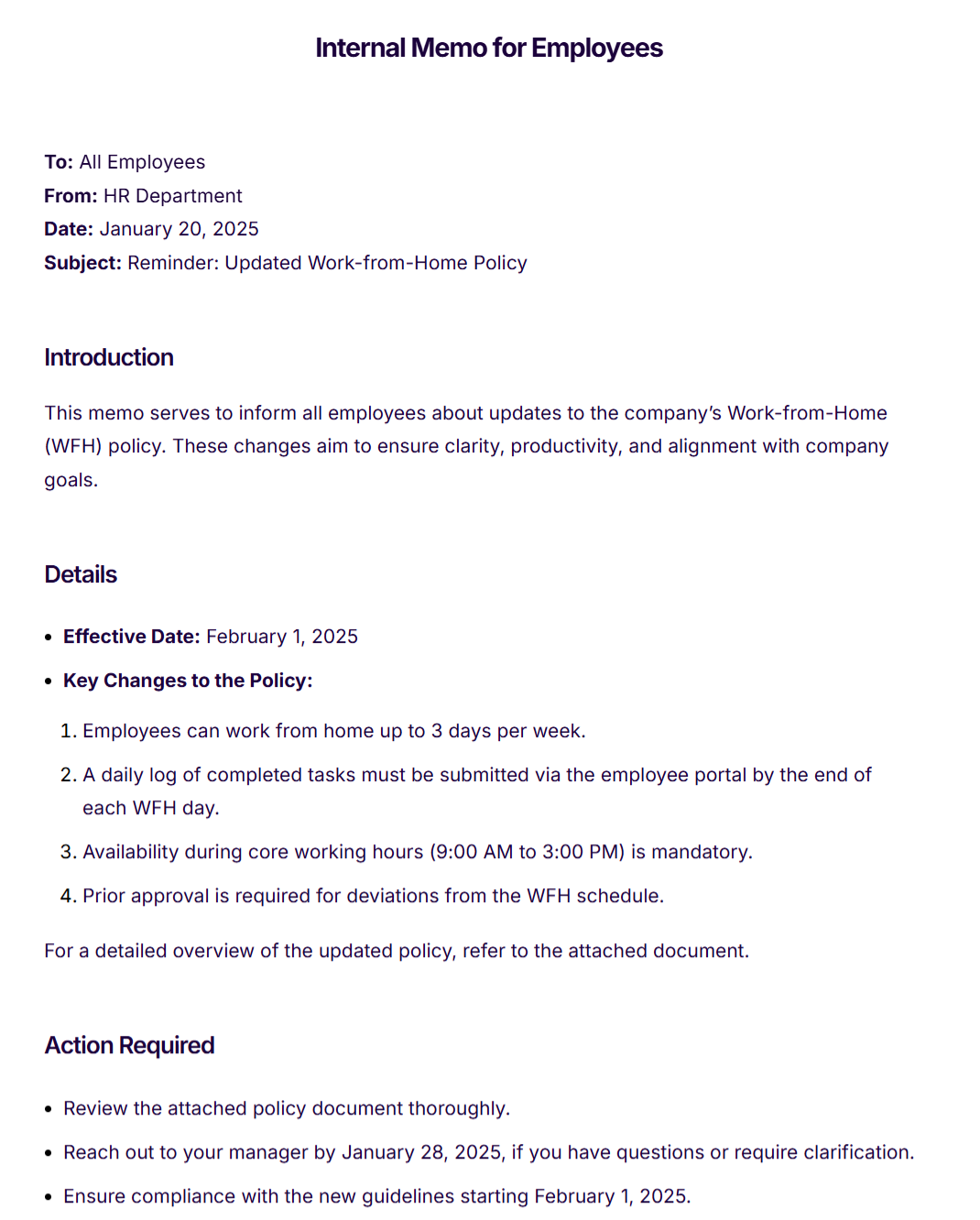
Internal Memo for Staff Meeting
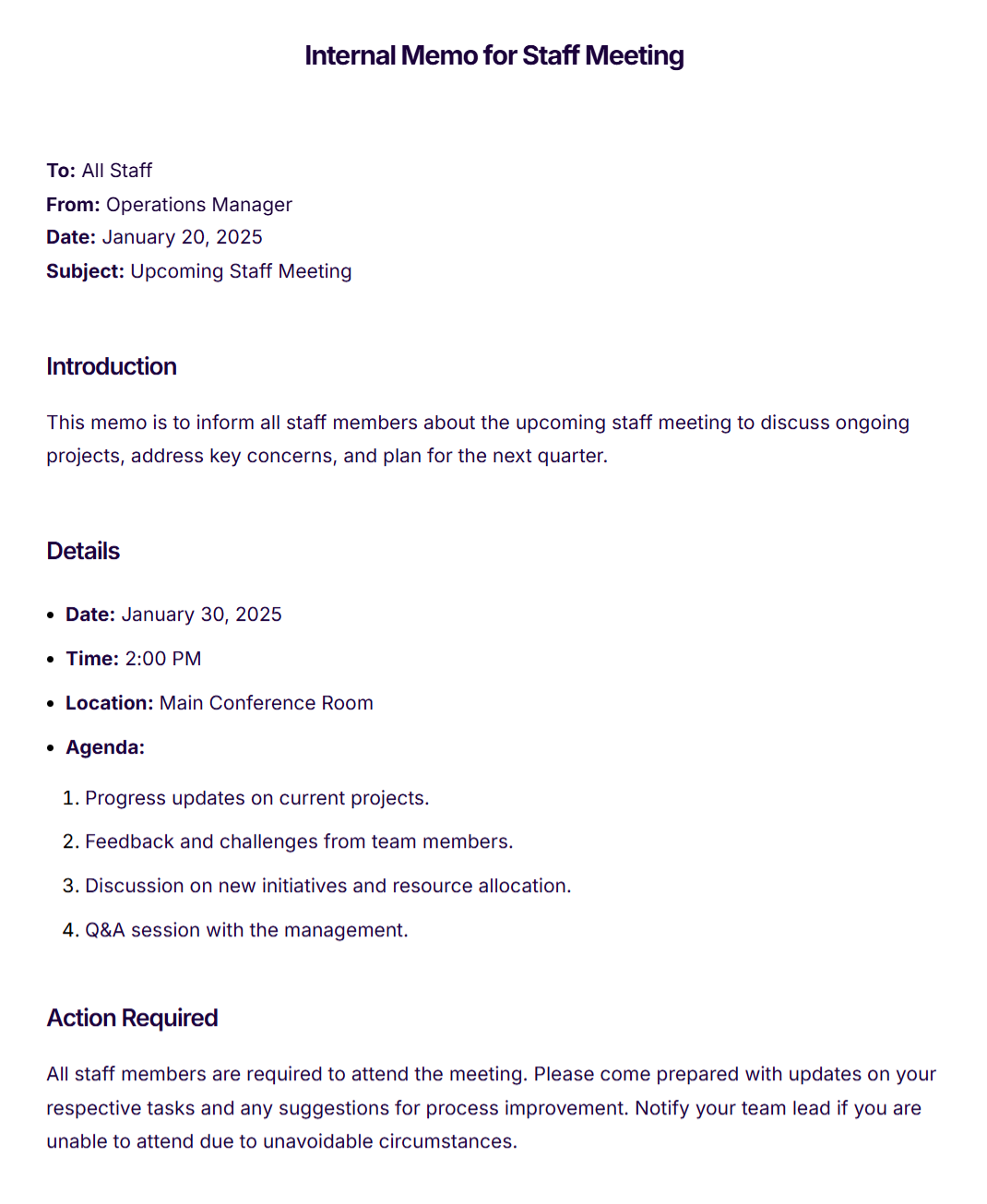
Internal Memo for School
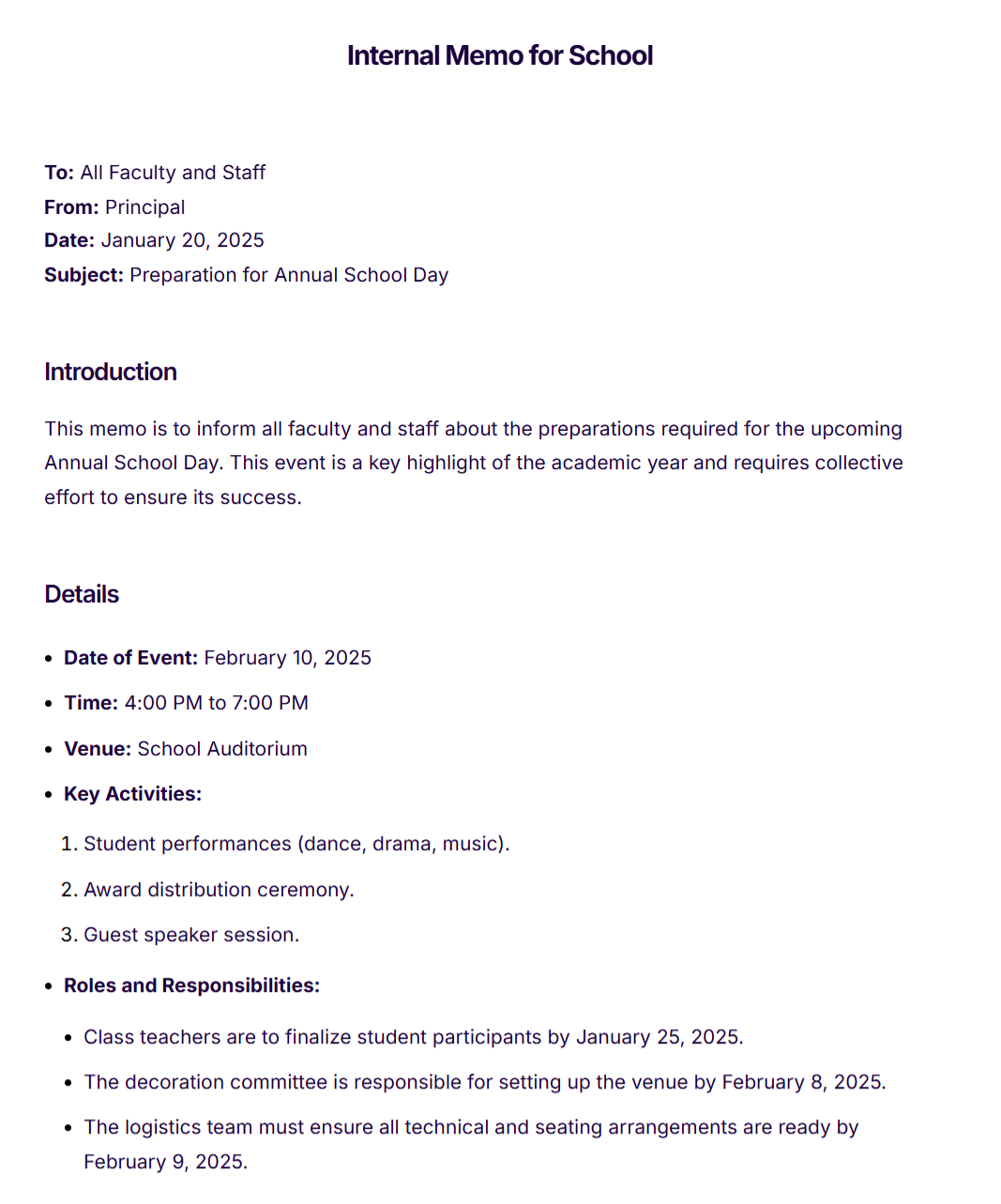
- Internal Memo for Public Holiday
- Internal Memo for Salary Increment
- Internal Memo for a Meeting
- Internal Memo for Company
- Internal Memo for Office Timing
- Internal Memo for Payment
Internal Memo Template
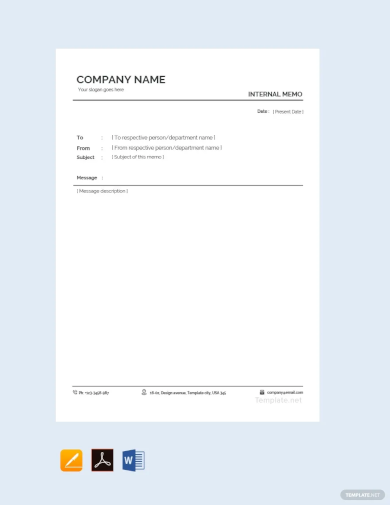
Internal Memo Example
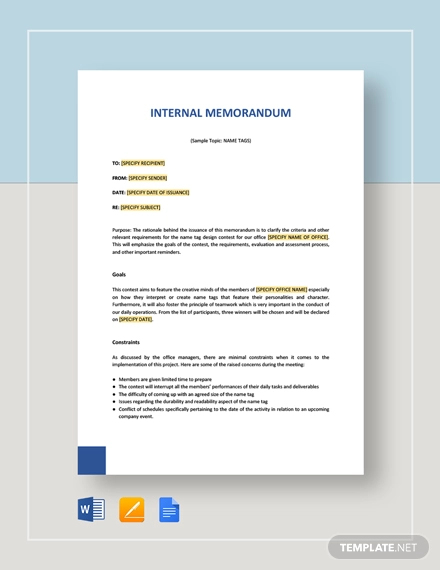
Free Internal Memo
Internal Memo to Employee
Management Internal Memo
Business Internal Memo
Why Do You Need an Internal Memo?
To put it simply, communications within the organization is vital to the everyday operations of a business. Timeliness and coordination is needed in completing projects and deadlines. Without any means or standard in getting information through, operations will be at a stand still resulting to the business suffering losses.
An internal memo ensures that communication between departments in an organization is maintained and responsiveness to action plans can be guaranteed whenever immediate action from an individual or department is needed or required.
Memo examples in PDF and office memo examples in the page further assistance in understanding how an internal memo is made. Feel free to browse all the other examples in the page as added sources.
What Are the Benefits of an Internal Memo?
Sending or handing out internal memos benefit the company in the following ways:
- Memos are far less expensive as to disrupting work and having a meeting where attendees could have been out there doing work that they are paid for.
- Memos also serve as evidence in case of disputes between employees and managers.
- Memos save time as they can be read at an employees own time.
- Memos have a far reaching audience in terms of delivery time. Emailed memos reach a number of people within seconds.
Memo examples in Word and formal memo examples seen on the page are sure to help you in making your own memo. They are provided for and available for download at your convenience.
How to Write a Internal Memo
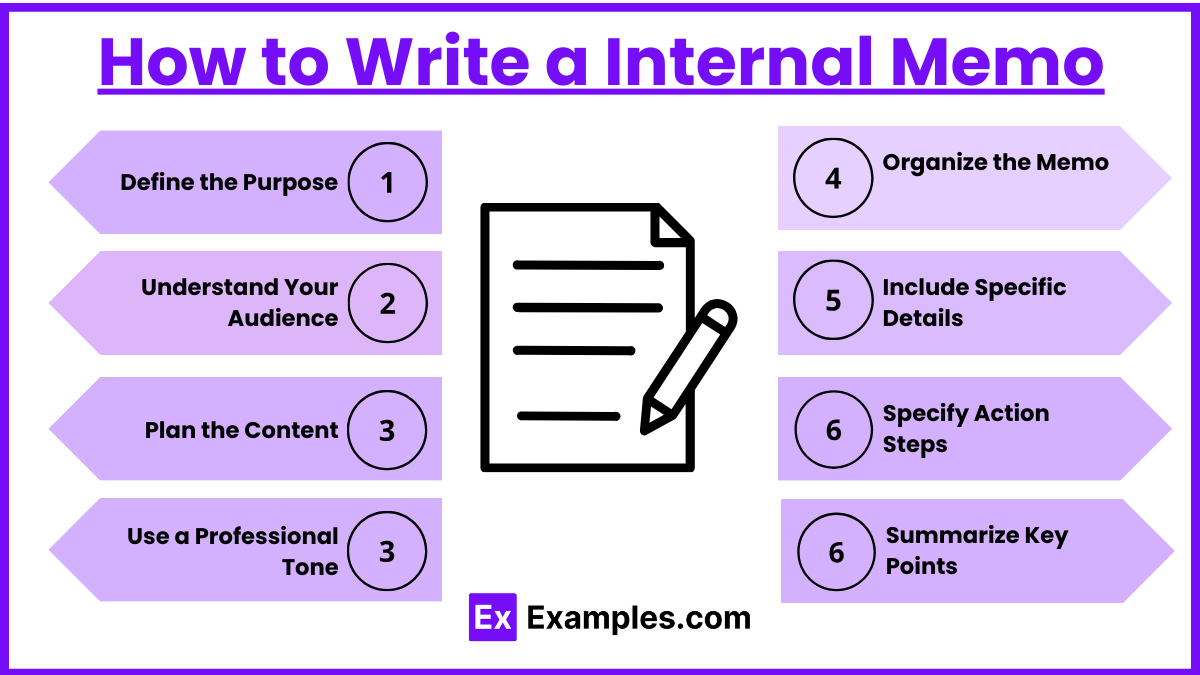
Define the Purpose
- Identify why the memo is being written (e.g., to announce a meeting, update policies, or share important information).
- Be clear about the objective so that the content stays focused.
Understand Your Audience
- Determine who the memo is for (e.g., specific teams, departments, or the entire organization).
- Tailor the tone and language to suit the recipients.
Plan the Content
- Outline the key points to include in the memo:
- The purpose of the memo.
- Relevant details or explanations.
- Specific actions required.
- Ensure the information is relevant and necessary.
Use a Professional Tone
- Keep the language formal and concise.
- Avoid unnecessary jargon or overly casual expressions.
Organize the Memo
- Start with a clear and concise subject line that summarizes the memo’s purpose.
- Use headings (e.g., Introduction, Details, Action Required) to structure the content.
- Break up long paragraphs into bullet points or lists for readability.
Include Specific Details
- Provide all the necessary information such as dates, times, locations, or deadlines.
- Ensure accuracy to avoid confusion or follow-up questions.
Specify Action Steps
- Clearly outline what the recipients need to do.
- Provide deadlines and contact information for clarification.
Summarize Key Points
- End the memo with a brief summary to reinforce the main message.
- Maintain a positive and collaborative tone to encourage engagement.
How to Format an Internal Memo
There is perhaps only one rule when making an internal memo. It has to be short and concise. A lengthy memo will only beg to be ignored or thrown in the bin. A memo just has to have the standard heading, introduction, body, and conclusion. All just need to be straight to the point and short.
Sample memo and company memo examples in the page are shown for additional reference in memo creation. These samples are accessible by clicking on the download link button under the sample.
- Present the main content of the memo in a clear, structured way.
- Use bullet points or numbered lists for better readability, where appropriate.
- Provide relevant information, data, or timelines.
Action Required
Specify the actions that the recipient(s) need to take. Include deadlines, responsibilities, or any follow-up steps that are necessary.
Conclusion
Summarize the key points of the memo and emphasize the importance of the information provided. Include an invitation to reach out for further clarification if needed.
Attachments
List any supporting documents or files that are included with the memo, if applicable.
Internal Memo Example
To: Sales Team
From: Sarah Johnson, Sales Manager
Date: January 20, 2025
Subject: Monthly Sales MeetingIntroduction
This memo is to notify you about the upcoming monthly sales meeting. The purpose of this meeting is to review performance metrics, discuss challenges, and strategize for the next month to meet our sales targets.
Details
- Date: January 25, 2025
- Time: 10:00 AM
- Location: Conference Room 2
- Agenda:
- Review of December 2024 sales performance.
- Identification of bottlenecks in the sales process.
- Brainstorming for lead generation strategies.
- Q&A session with the management team.
Please bring the following documents:
- Last month’s sales report.
- Current client engagement data.
Action Required
All team members are required to prepare a brief update on their sales progress and highlight key challenges faced during the previous month. Submit your updates to me by January 24, 2025, for review.
Conclusion
Your participation and input are crucial for improving our strategies and achieving our monthly goals. Feel free to contact me if you have any questions or need assistance in preparing your updates.
Attachments
- December 2024 Sales Performance Report
- Updated Sales Strategy Guidelines
Internal Memo Examples
Internal Memo for Employees

Internal Memo for Staff Meeting

Internal Memo for School

- Internal Memo for Public Holiday
- Internal Memo for Salary Increment
- Internal Memo for a Meeting
- Internal Memo for Company
- Internal Memo for Office Timing
- Internal Memo for Payment
Internal Memo Template

Internal Memo Example

Free Internal Memo
Internal Memo to Employee
Management Internal Memo
Business Internal Memo
Why Do You Need an Internal Memo?
To put it simply, communications within the organization is vital to the everyday operations of a business. Timeliness and coordination is needed in completing projects and deadlines. Without any means or standard in getting information through, operations will be at a stand still resulting to the business suffering losses.
An internal memo ensures that communication between departments in an organization is maintained and responsiveness to action plans can be guaranteed whenever immediate action from an individual or department is needed or required.
Memo examples in PDF and office memo examples in the page further assistance in understanding how an internal memo is made. Feel free to browse all the other examples in the page as added sources.
What Are the Benefits of an Internal Memo?
Sending or handing out internal memos benefit the company in the following ways:
- Memos are far less expensive as to disrupting work and having a meeting where attendees could have been out there doing work that they are paid for.
- Memos also serve as evidence in case of disputes between employees and managers.
- Memos save time as they can be read at an employees own time.
- Memos have a far reaching audience in terms of delivery time. Emailed memos reach a number of people within seconds.
Memo examples in Word and formal memo examples seen on the page are sure to help you in making your own memo. They are provided for and available for download at your convenience.
How to Write a Internal Memo

Define the Purpose
- Identify why the memo is being written (e.g., to announce a meeting, update policies, or share important information).
- Be clear about the objective so that the content stays focused.
Understand Your Audience
- Determine who the memo is for (e.g., specific teams, departments, or the entire organization).
- Tailor the tone and language to suit the recipients.
Plan the Content
- Outline the key points to include in the memo:
- The purpose of the memo.
- Relevant details or explanations.
- Specific actions required.
- Ensure the information is relevant and necessary.
Use a Professional Tone
- Keep the language formal and concise.
- Avoid unnecessary jargon or overly casual expressions.
Organize the Memo
- Start with a clear and concise subject line that summarizes the memo’s purpose.
- Use headings (e.g., Introduction, Details, Action Required) to structure the content.
- Break up long paragraphs into bullet points or lists for readability.
Include Specific Details
- Provide all the necessary information such as dates, times, locations, or deadlines.
- Ensure accuracy to avoid confusion or follow-up questions.
Specify Action Steps
- Clearly outline what the recipients need to do.
- Provide deadlines and contact information for clarification.
Summarize Key Points
- End the memo with a brief summary to reinforce the main message.
- Maintain a positive and collaborative tone to encourage engagement.
How to Format an Internal Memo
There is perhaps only one rule when making an internal memo. It has to be short and concise. A lengthy memo will only beg to be ignored or thrown in the bin. A memo just has to have the standard heading, introduction, body, and conclusion. All just need to be straight to the point and short.
Sample memo and company memo examples in the page are shown for additional reference in memo creation. These samples are accessible by clicking on the download link button under the sample.



